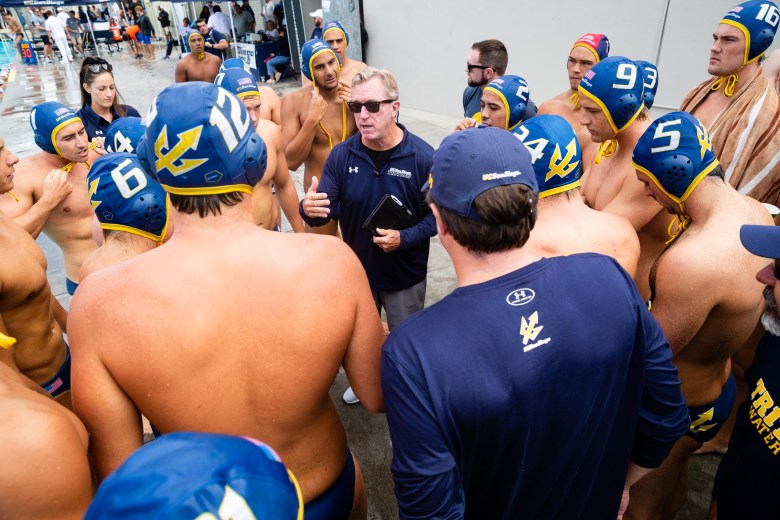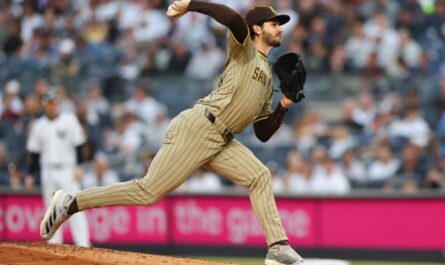Denny Harper, who was a member of the 2025 class of the USA Water Polo Hall of Fame and the men’s water polo coach at UC San Diego from 1980 to 2021, stated he started coaching while still in high school.
Harper, a traditional basketball and football player who grew up in Orange County in the late 1960s and early 1970s, enjoyed surfing off the shore of Newport Beach in the summers.
However, Harper said that he experienced knee pain during his first year at Rancho Alamitos High School in Garden Grove due to Osgood-Schlatter’s Disease, an overuse condition typical in developing teenagers.Harper remarked, “I couldn’t play football.” which at the time was perhaps the most terrible thing that had ever occurred to me. I sobbed for a week or two before receiving a visit from a man named Tom Moore.Harper was invited to test out for both the high school swimming and water polo teams, where Moore was the captain.
Harper expressed his displeasure with Moore’s proposition and stated that he still desired to play football.
Harper claims that although water polo was a competitive sport in Orange County in the early 1970s, its popularity had not yet skyrocketed, unlike what would happen over the following 20 years.
But he tried his hand at the sport.
Harper stated, “I persevered, and things kind of kicked in for me my sophomore year.”
Then, in his junior year, he was invited to coach a group of girls who wanted to form a water polo team.
Despite being the captain of the boys’ water polo team and the leader of every team he had played on as a child, in any sport, Harper claimed he had no idea why they had asked him.
Harper said he started using his family’s rotary phone to schedule games because there weren’t many high schools in the Garden Grove area with female water polo teams at the time.
Harper claimed that he found himself taking the responsibility of leading the squad rather seriously after the first shock of being in command of his friends and peers.
Harper stated, “We wanted to get better.” Our goal was to triumph.
Harper spent two years playing water polo at Santa Barbara City College after graduating from high school. It was there that he made his best buddy, Russ Hafferkamp, who is also a member of the USA Water Polo Hall of Fame.
Harper joined the men’s varsity squad at San Diego State University after transferring there in 1976.
A former high school player approached Harper while he was playing for the men’s squad and asked if he would coach the school’s new women’s club team.
Harper consented, and from 1977 to 1983, she coached SDSU’s women’s club team for six years.
Harper claimed that his SDSU women’s teams defeated the US National Team and the Hungarian National Team, which at the time was among the best in the world, 130-18 in exhibition matches.
During his time at SDSU, Harper remarked, “We won a lot of tournaments.” We were essentially in the lead.
Harper was teaching at Horton Elementary School, which is close to Lincoln Park, and coaching the SDSU women’s team in 1980 when Hafferkamp came up to him and asked if he would want to coach the UCSD men’s team as well. The head coach of the UCSD men’s team, who was his friend, was departing for another position.
Harper agreed.
Get La Jolla Village News in your inbox community news that connects and informs.
Register to receive breaking news, the Times of San Diego daily at 8 a.m., and free weekly La Jolla news. Update whenever you want. You acknowledge and agree to the terms by clicking “Sign Up.”
He claims he still had his first coaching salary of $800 from the 1980 season, when he coached the UCSD men.
Harper was also asked to coach the women’s varsity squad at UCSD in 1983.
He claimed that because his athletes recalled his accomplishments at SDSU, his two years or so as the women’s coach at UCSD were a little awkward.Harper claimed that they detested me because, while I was at San Diego State, I consistently defeated them. “Why is he here?” they asked.
However, his allegiances had changed. As the women’s coach at UCSD, Harper claimed that his teams had never lost to SDSU.
UCSD won the first three competitions when USA Water Polo started supporting a women’s collegiate national championship in 1985.
According to Harper, women’s water polo in the 1980s was akin to the wild west.
Harper remarked, “I love that era of coaching women’s water polo.” since everything was comparable. It wasn’t actually supported by any [athletic] departments, and nobody had any actual money. Coaches did not receive compensation; they did it out of passion for the game.
Harper led the UCSD women’s team to two additional national titles after their 1985–1987 championship run. Harper left after the 1999 season to concentrate on the men’s program.
Harper won 697 games and qualified for 15 national championships while coaching the men’s team at UCSD. The team finished second in the nation in 2000 and third in 1995, 1998, and 2006.
Harper claimed that UCSD games drew large crowds because water polo teams were not categorized as level I, II, or III, but rather played in an open level.
Harper claims that the UCSD team improved after he took over as coach because he provided his players with an offseason conditioning program, switched their 1981 practices from the school’s indoor, shallow end pool to the 50-meter pool at the Miramar Naval Air Station, and arranged games against two of the top programs in the nation, Cal and UCLA.
Harper claimed that the program’s national ranking of 10th in his second season as UCSD men’s coach was unprecedented.
Get neighborhood news in your inbox. It’s free and enlightening.
Become one of the 20,000+ individuals who receive breaking news alerts and the Times of San Diego in their inbox every day at 8 a.m.
Weekly updates from San Diego communities have also been provided! You acknowledge and agree to the terms by clicking “Sign Up.” Choose from the options below.
Harper remarked, “We were the first team at UCSD to prove you can play up,” alluding to his team’s games against DI powerhouse USC, while other UCSD schools participated at the DIII level.
Despite one player suffering meningitis and another being hurt in a bike accident, UCSD finished 10th nationally in 1981, according to Buc Buchanan, who captained the team in 1982.
When Harper became the team’s new coach, Buchanan said in an email that Harper came off as a self-assured individual, a leader with a vision, and a coach with a strategy.
Harper claimed that his decision to resign was impacted by the COVID outbreak and an increase in administrative duties.
Harper claims that NIL transactions won’t become popular at UCSD.
Harper remarked, “I just don’t see it happening.” It will discourage the long-held belief that children will continue to attend UCSD because they always have and will perform above expectations. They excel in their athletics because they excel in the classroom.
Harper continues to coach the San Francisco Olympic Club master’s squad in international competitions even though he is retired.
Harper said that his time at UCSD wasn’t solely focused on achievement.
“I was the one who was called by [the UCSD athletic director] to somehow keep the boys from going to prison if there were shenanigans happening at UCSD in the 1980s,” he added.
Now, how would he characterize those teams? At their most Raider-like, he described them as a hybrid of the Los Angeles Raiders and the Bad News Bears.

 by
by 

